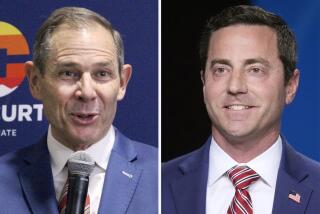Romney and the Mormon factor
Mitt Romney must be bracing for a few bad weeks in uber-evangelical states in the South and Midwest. He already lost big in Kansas to Rick Santorum. The Alabama and Mississippi primaries Tuesday, and the Missouri caucuses this weekend, will probably go to either Santorum or Newt Gingrich, further delaying Romneyâs slow if apparently inexorable march toward the Republican nomination.
One clear obstacle for the front-runner: being Mormon.
In Michigan and Ohio, evangelical Protestants nearly denied Romney a win, opting for the Roman Catholic Santorum in overwhelming numbers. Ironically, Romney squeaked by with a majority of the sizable Catholic vote in both states.
COMMENTARY AND ANALYSIS: Presidential Election 2012
Romneyâs evangelical problem is easy to understand. Last October, the Rev. Robert Jeffress, a Rick Perry supporter, denounced Mormonism as a âcult.â In Michigan, 44% of prospective primary voters told pollsters that they did not regard Mormons as Christians. While such voters may well have found other reasons to reject Romney, his inability to appeal to many voters on the basis of religion puts him at a distinct disadvantage.
The national media have hardly helped to erase Romneyâs Mormon problem in recent weeks. Journalists and Romneyâs opponents have mostly avoided questioning him directly on the fine points of Mormon theology. (His standard response: Questions about Mormonism should be directed to the church, not to him.) Still, articles about two controversial aspects of the religion have been pervasive in recent weeks: Mormon proxy baptisms of Jews, and the churchâs historical ban on black men in the Mormon priesthood (the ban was lifted in 1978). There are few African Americans and Jews among the GOP primary electorate, but such talk reinforces Americansâ unease about Romneyâs faith.
But is the news all bad for the candidate? In 2008, most observers discussed Barack Obamaâs race as a potential impediment to his electoral success. Hillary Rodham Clinton won nearly half of the nationâs Democratic primaries and caucuses, and she racked up large majorities of the white vote as the primary season advanced. In the end, African Americans gave Obama a decisive edge across the South and allowed him to gain the upper hand. (Obama also out-organized Clinton in caucus states across the country.) Obamaâs apparent obstacle became an enormous advantage.
Mormons are a much smaller minority in the United States than African Americans, a little less than 2% of the population versus more than 12%. Nevertheless, it helps to have a small but dedicated segment of the population behind you. Without discounting the obstacles his religion creates, being Mormon can also help him.
While much of Romneyâs money edge comes from his Wall Street connections, Mormons boosted his grass-roots fundraising in Arizona, for example.
Romneyâs fellow Latter-day Saints, moreover, can also make a positive difference at the ballot box. In the caucus states of Nevada and Idaho, large numbers of dedicated Mormon supporters allowed Romney to score huge wins. In Arizona, Latter-day Saints created a Romney rout. According to exit polls, 14% of Arizona Republican primary voters were Mormons, and virtually all of them voted for Romney. His built-in advantage apparently discouraged other candidates from seriously contesting Arizona and allowed the former Massachusetts governor to take all 29 Arizona delegates while focusing his own efforts on Michigan.
Especially in a primary season with unremarkable turnout, even small Mormon minorities in states such as Ohio (0.5% of the population but probably 1% or 2% of Republican primary voters) have surely helped Romney in ways that exit polls cannot measure.
Going forward, Mormons may play an unexpected role in helping Romney finally secure the nomination. Even if he loses in Alabama and Mississippi on Tuesday, Hawaiiâs large Mormon population (5%) will probably help him salvage a victory that same day.
Looking further ahead, Romney will probably lose a majority of the remaining contests in March, April and May. Some of those potential losses, such as in delegate- and evangelical-rich Texas, could be devastating for a candidate who wants to appear inevitable. Three months from now, Romneyâs now sizable delegate lead will look less imposing.
But at the end of the road, Romneyâs co-religionists might well save his campaign. California is the last big delegate prize, holding its primary in early June. Two percent of Californians are affiliated with Romneyâs church, but those numbers will translate into a much higher percentage of Republican primary voters.
Four years ago, Mormon fundraising and activism were crucial to the narrow passage of Proposition 8 in California. In this case, no hierarchy encouragement will be necessary to prod the Golden Stateâs Latter-day Saints to help push their fellow Mormon over the top. Amid the ups and downs of his campaign, Romney has retained a consistent lead in California Republican voter polls and stands to capture a large majority of the stateâs delegates.
Should the race still be in doubt, one final primary awaits the Republican contenders on June 26. It should be icing on Romneyâs cake: It will take place in Utah.
John G. Turner is the author of âBrigham Young: Pioneer Prophet,â forthcoming in September.
More to Read
A cure for the common opinion
Get thought-provoking perspectives with our weekly newsletter.
You may occasionally receive promotional content from the Los Angeles Times.










